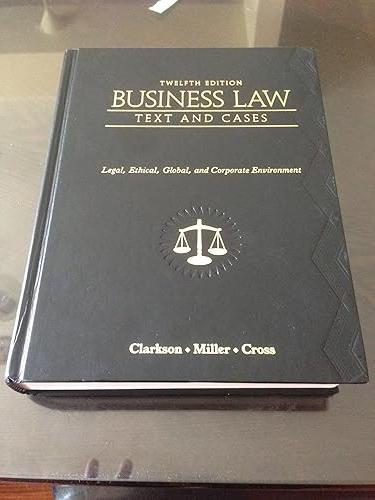Southwest Desert Images, LLC (SDI) was hired by Warners employer, Aegis Communications (Aegis), to perform landscaping and
Question:
Southwest Desert Images, LLC (SDI) was hired by Warner’s employer, Aegis Communications (Aegis), to perform landscaping and weed control. On September 29, 2003, SDI employee
[David] Hoggatt began spraying an herbicide on weeds on the property around Aegis’s building. * * * After approximately an hour and a half of spraying, Hoggatt was informed that people inside Aegis’s building were complaining. The herbicide spray had entered the building through its air conditioning system and had circulated throughout the building. After being informed of the situation, Hoggatt stopped spraying. Emergency services arrived as the building was being evacuated.
Employees in the building complained of respiratory problems and itching and burning eyes.
Prior to and during the evacuation,
[an Aegis employee, Catherine]
Warner began having diffi culty breathing, was coughing violently, and felt burning in her eyes, nose, and throat. As she exited the building, Warner began to feel faint and felt “extreme chest pain” and heart palpitations. Warner had had [two heart attacks in the past], and had undergone heart surgery in May 2003. * * * She was then transported by ambulance to the hospital, where she was treated and released after about four hours.
* * * [It was later determined that Warner had suffered a heart attack on the day of the evacuation. She continued to experience health complications that she blamed on exposure to the spray.]
Warner sued SDI for negligence in September 2004, later amending her complaint to include * * *
Hoggatt [and several others as defendants].
* * * *
The jury found SDI to be completely responsible for the injuries Warner suffered by inhaling the herbicide. * * * It awarded Warner
$3,825 in compensatory damages and costs against SDI. [Warner appealed.]
On the last day of trial, the court entered a directed verdict in favor of Hoggatt because “the evidence
[wa]s undisputed that Mr. Hoggatt
[had] acted within the scope of his employment for [SDI],” and, thus, that SDI was “clearly liable in situation for whatever damages the jury does fi nd in this matter.” There was no dispute at trial that Hoggatt had been negligent * * *.
We agree with Warner that “there was no legal basis for the court’s decision to dismiss Hoggatt from the action.” It is well-established law that an agent will not be excused from responsibility for tortious conduct merely because he is acting for his principal. [Also, as stated in the Restatement (Third) of Agency], “An agent is subject to liability to a third party harmed by the agent’s tortious conduct. Unless an applicable statute provides otherwise, an actor remains subject to liability although the actor acts * * * within the scope of employment.” [Emphasis added.]
Hoggatt cites no authority suggesting this rule should not apply in this case. He does, however, argue the error was harmless. * * *
Hoggatt asserts Warner was not prejudiced [injured] because “the jury apportioned one hundred percent of the fault to SDI. Adding other possible parties to the jury verdict form would not have changed the outcome of this case.” We agree that including Hoggatt as a defendant throughout the trial could not have changed Warner’s damage award, and Warner does not argue otherwise.
Nor is there a need for the jury to apportion fault between Hoggatt and SDI—the liability of those parties is joint and several.
That the error does not warrant a new trial, however, does not mean it was not prejudicial to Warner. She has a right to recover her damages from Hoggatt, and his improper dismissal has deprived her of that right. Accordingly, we reverse the trial court’s grant of a directed verdict in Hoggatt’s favor and amend the judgment in Warner’s favor to show it is against Hoggatt as well.
Questions:-
1. Why should Hoggatt be personally liable if he merely followed the instructions of his employer, SDI, given that the employer is better able financially to pay the judgment and may have insurance that covers the matter?
2. How could SDI reduce the likelihood of similar lawsuits occurring in the future?
Step by Step Answer:

Business Law Text And Cases Legal Ethical Global And Corporate Environment
ISBN: 9780538470827
12th Edition
Authors: Kenneth W. Clarkson, Roger LeRoy Miller, Frank B. Cross





